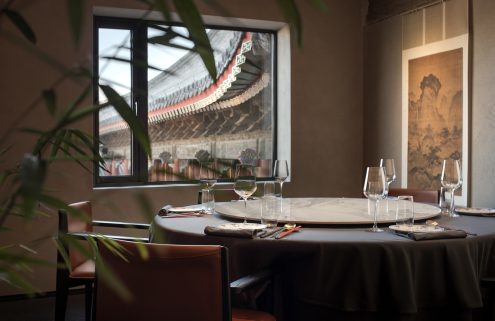With its reputation for sensual, sensory, deeply atmospheric spaces where raw, earthy materials connect to geography, the body-care brand Aesop has a lot in common with the ancient Chinese silk city of Suzhou. So it’s no surprise the Australian group’s latest boutique sits so comfortably within a heritage hall in a tranquil cobbled courtyard by the 400-year-old city walls.
Dating to the Qing Dynasty, Phoenix Hall is a rare remnant of dynastic China in Suzhou’s historic commercial district, better known as the ‘four-sided flower hall’. To make the most of its extraordinary gables and woodwork, architects Nie Xuan and Yuan Yuan of Shanghai’s Offhand Practice have carved out six decorative doors on the south-facing street facade. A secondary entrance on the gable side regulates the flow of movement and allows sightline to the garden.

Photography: Fangfang Tian

Photography: Fangfang Tian

Photography: Fangfang Tian

Photography: Fangfang Tian

Photography: Fangfang Tian

Photography: Fangfang Tian

Photography: Fangfang Tian
Inside, they’ve intervened with whitewashed walls, traditional black tiles and storage that integrates with the dark wood trim. The only conspicuously modern element is a central sculptural stone sink inlaid with copper, where visitors can gather to test the products on show. The sink was designed to echo the ancient stone and flowing water of Suzhou’s famous landscape.
The architects have organised the layout by marking out areas of light and shade – like a classical garden akin to the ones along the nearby Waicheng River. They’ve partitioned off a central hallway around the communal sink to foster interaction and lend a sense of ceremony to the act of product testing. Over the sink is a custom lantern that speaks to Suzhou’s textile history. The semi-sheer silk shade was embroidered with scenes by artist Liang Xuefang, who employed traditional embroidery techniques inspired by Qing Dynasty painting. A contemporary reference to the ‘shade’ theme, it recalls a painted scroll unfurling in the air
Off the central hall are dimmer, more private enclosed rooms, where product shelves are positioned along original beams and columns. On the flanks are an ensuite sink and antique seating offering a more intimate experience – as well as an elegant ‘fragrance armoire’, like a cabinet of curiosities. Doors to the rooms are accented in copper, nodding to Qing Dynasty furniture yet bringing a fresh and exciting shimmer to a constricted space.

























